Magrunner: Dark Pulse Review
There is something that feels familiar about Magrunner: Dark Pulse, a first-person puzzler from developer Frogwares. There is certainly a very Portal feel about affairs, from the art style (at least in the early-to-mid game), to the core gameplay mechanics of moving from chamber to chamber, solving puzzles and moving blocks around. Even the default crosshair mirrors Portal. Yes, it's somewhat lazy to describe a game in a review as being 'like another game', but seriously; it's pretty Portal-esque.
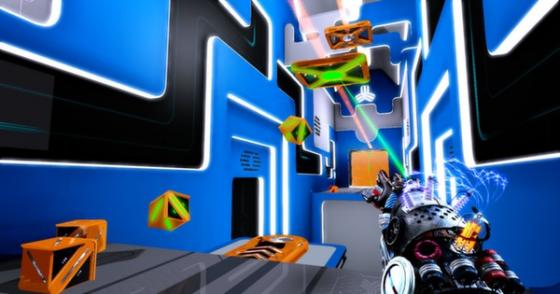
In Magrunner: Dark Pulse, hero Dax is one of seven near-future world residents selected from among the population to undergo specialist 'Magrunner' training in order to become one of the world's first civilian-astronauts for an ambitious space program of a globe conquering mega-corporation / social networking giant.
Apparently, being an astronaut requires nothing except the ability to solve puzzles by manipulating magnetic fields. Just ask Buzz Aldrin, he knows...
The principles of the gameplay are simple. Using your portal gun... sorry, I mean mag glove... you can fire either a 'green' or 'red' magnetic charge (or, should you prefer, an alternate colour scheme of your choice) at various objects in each chamber, such as platforms, boxes and panels. This creates a magnetic field, either surrounding the object in the case of platforms and boxes, or creating an long cylinder of magnetism directly forward from a panel. Using these magnetic fields, Dax can manipulate his surroundings by causing objects to be attracted to each other, or repelled from one another.
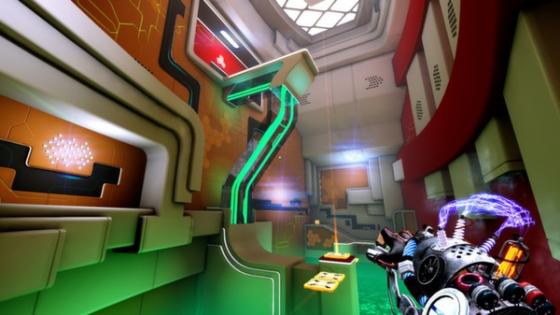
Later in the game you add further options to your puzzle solving arsenal with the ability to drop a single magnetic point on almost any flat surface. All together, in the more complex of puzzles you'll be managing several objects simultaneously, all of which are being manipulated through the influence of one or more conflicting or attracting magnetic fields
Now, if you remember your old school science classes you will recall that, in magnetism, oppositely charged fields attract (negative and positive), whereas 'like' fields repel each other (negative and negative, positive and positive). In Magrunner these rules are reversed: 'like' fields attract and opposite fields repel. It's a step away from real science, but is necessary for the puzzle setup to work properly and, once you get your head around it, becomes almost second nature. It's the kind of mind-bending physics that you can subconsciously work with without giving it too much thought, but it all falls apart when you try to consider it logically. Kind of like another puzzle game I could mention.
While Magrunner lacks the humour of Portal, it does make an effort when it comes to plot. An initial cyberpunk / sci-fi setting makes way for a eldritch slice of the Cthulhu mythos (based on the horror writing of early 20th century author, H. P. Lovecraft) as the game progresses and takes a distinct turn for the supernatural. Unfortunately, a combination of poor voice acting, awkward and distinctly non-scary monsters and some plot development weaknesses prevent this from achieving anything greater than a bit of background story, although the effect on the layout of the later levels is interesting.
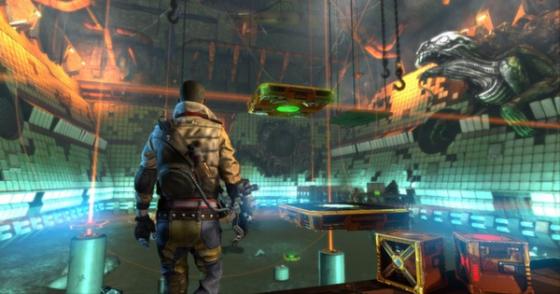
In terms of gameplay, the game is extremely entertaining; at least for the first ¾ of play. Puzzles are taxing at this stage, but never overwhelming and unlikely to block progress for any significant amount of time. You'll find yourself manipulating the movement of platforms, dragging items along walls and hurling boxes over long distances - either to smash things, disrupt electrical fields or even as a method of locomotion.
This portion of the game will fly over, as the slowly increasing complexity and scope of the puzzles keeps the player coming back for "just one more level": before finding themselves three hours past their bedtime and destined to a tired day in the office tomorrow. The rush of successfully completing a puzzle and the promise of an even better one to come is the perfect recipe for addiction.
Unfortunately the difficulty takes a step for the tough in the latter stages of the game, with puzzles encountered requiring increasingly complex and overly specific methods of solving; requiring a combination of flawless reactions, ultra-accurate shooting and increasingly obtuse solutions. This latter stage of the game will serve to frustrate more frequently than it does entertain, and will send many players reaching for FAQs and walkthrough videos.
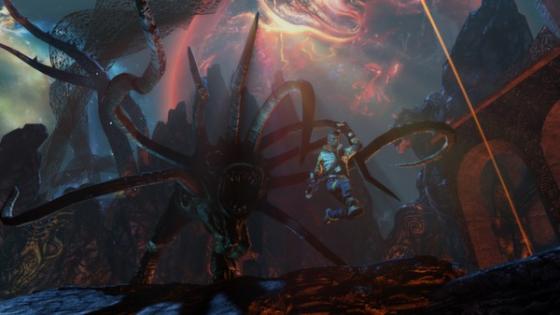
Of particular unpleasantness are those moments in the game in which Dax finds himself face-to-face with a monstrous mythos entity. These sequences generally involve running away until you can either escape, or get your hands on a explosive crate to launch at the enemy. These sequences are frustrating as controlling Dax is not as smooth as in contemporary first-person titles, so defeat in these sections often feels like the result of struggling with poor controls rather than any flaw in the player's own skill or strategy.
The art style encountered in Magrunner is almost Tron-like, with the whites and blacks of the chambers being starkly contrasted by the bright green and red colours of magnetically charged objects. The colours can be further emphasised at the press of a button, which allows you to actually view the magnetic fields surrounding an object.
The clinical feel of the training chambers is also certainly reminiscent of Portal. The later levels introduce some of the the grotesque alien inhabitants of the mythos, which fans will recognise, as well as a more horror-like environment. While the monsters themselves are not particularly threatening in their appearance, the mix of horror and high technology throughout the later levels is an interesting clash of styles.
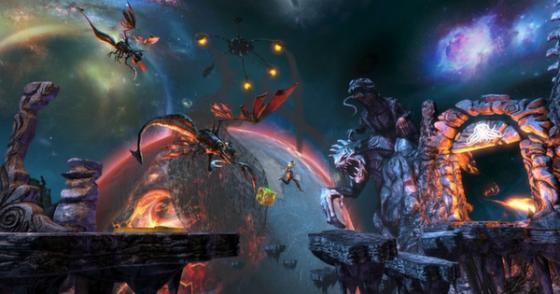
Despite these setbacks in the later game, the package is still an overall positive experience. A low-budget price point will provide most players with 8-10 hours of gameplay, or perhaps a tad less if you are a real smarty-pants when it comes to mind-boggling physics puzzles. This means you'll be looking at 6-7 hours of extremely enjoyable puzzle action before things start to feel unfairly difficult; and even then there is fun to be had if you can get past the frustration. For this price, Magrunner: Dark Pulse is definitely one that puzzle / Portal fans should look into.
Magrunner: Dark Pulse (Reviewed on Windows)
This game is good, with a few negatives.
There is something that feels familiar about Magrunner: Dark Pulse, a first-person puzzler from developer Frogwares. There is certainly a very Portal feel about affairs, from the art style (at least in the early-to-mid game), to the core gameplay mechanics of moving from chamber to chamber, solving puzzles and moving blocks around.









COMMENTS
The Griddler - 11:42pm, 3rd April 2015
I love first-person puzzle games like Portal and Quantum Conundrum. Might give this one a go.
Emseypenguin - 11:42pm, 3rd April 2015
Looks fun! How budget is budget?
Ewok - 11:42pm, 3rd April 2015 Author
£14.99 on Steam, Green Man Gaming and direct from official site. Not bad at all for 8-10 hours play.